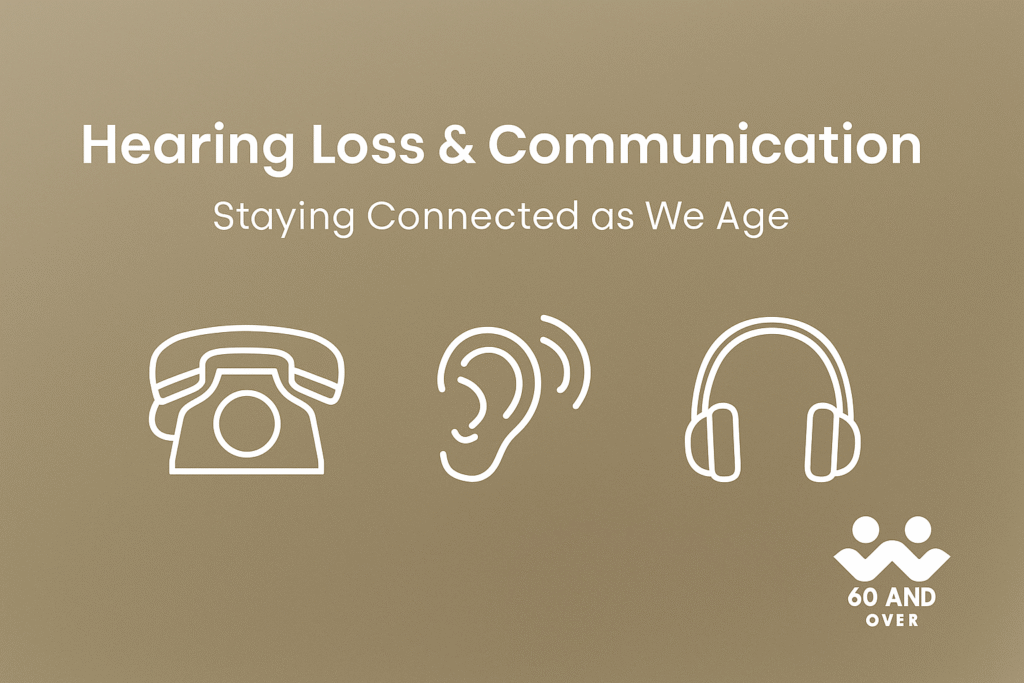Introduction: Why Hearing and Communication Matter
Hearing is more than just sound — it’s connection. For seniors, hearing loss can gradually make conversations harder, phone calls more stressful, and family gatherings less enjoyable. Without clear communication, many begin to withdraw from daily interactions. This isolation is not just frustrating; it can affect emotional health, relationships, and even cognitive well-being.
But hearing loss does not have to mean losing connection. With practical strategies, modern technology, and family support, seniors can continue to enjoy meaningful communication and active participation in life.
Understanding the Impact of Hearing Loss
Nearly one in three adults over the age of 65 has some form of hearing loss. The changes often happen slowly, so seniors and families may not notice at first. Over time, however, the effects become more visible:
- Conversations feel exhausting. Asking others to repeat themselves can feel frustrating.
- Background noise makes things worse. Busy restaurants or family gatherings may blur speech into a confusing hum.
- Misunderstandings happen. Seniors may answer incorrectly or miss important details, leading to embarrassment.
- Social withdrawal begins. To avoid these difficulties, some may skip outings or avoid phone calls altogether.
Hearing loss doesn’t just affect seniors. Families, caregivers, and friends feel the strain too. Communication challenges can lead to impatience, tension, and even conflict if not addressed with understanding.
The Emotional Side of Hearing Loss
Hearing difficulties often go beyond the physical. For many seniors, the emotional effects are just as heavy:
- Embarrassment. Constantly asking “What?” or “Could you repeat that?” can feel awkward.
- Frustration. Mishearing jokes, missing story details, or getting instructions wrong builds stress.
- Isolation. Over time, seniors may sit quietly rather than risk mistakes.
- Strain on relationships. Families may feel ignored, while seniors may feel excluded.
This emotional impact is why communication strategies and supportive environments are just as important as devices or medical treatment.
Everyday Communication Tips for Families and Caregivers
Small changes in how families and caregivers communicate can make a big difference. These strategies are practical, affordable, and effective:
1. Use face-to-face conversation: Seniors often rely on lip-reading and facial cues. Sit in front of them, make eye contact, and avoid talking from another room.
2. Speak clearly, not loudly: Raising your voice can distort words. Instead, speak slowly, with natural pauses.
3. Reduce background noise: Turn off the TV or move away from busy areas during important conversations.
4. Rephrase instead of repeat: If a senior doesn’t understand, change the wording rather than repeating the same phrase louder.
5. Check for understanding: Instead of asking “Did you hear me?” try “Does that make sense?” This keeps conversations collaborative rather than one-sided.
6. Write it down when needed: A quick note or text can reinforce important details like appointments, times, or addresses.
How Technology Helps Seniors Stay Connected
Modern technology has created new ways to make communication easier, even beyond traditional hearing aids.
- Amplified and captioned phones. These increase volume and display words as text on the screen, helping seniors follow conversations.
- TV streamers and wireless headsets. Seniors can watch television at their preferred volume without disturbing family members.
- Personal amplifiers. Small, portable devices capture sound and deliver it directly through earphones.
- Smartphone apps. Live captioning and speech-to-text apps can turn conversations into readable text in real time.
- Video calls. Seeing faces and lips while talking improves understanding and reduces miscommunication.
Technology should never feel overwhelming. Seniors often do best with devices that are simple, reliable, and designed with large buttons or clear displays.
Building a Supportive Home Environment
Beyond devices, the home itself can support better communication. Caregivers can make adjustments that reduce stress and encourage seniors to stay involved:
- Install good lighting so faces are always visible during conversation.
- Create quiet spaces for important discussions.
- Use nightlights and alarms that include visual signals, not just sound.
- Encourage seniors to participate in family decisions, conversations, and social activities.
A supportive home environment reduces frustration, boosts independence, and keeps seniors engaged.
The Role of Family and Caregivers
Families are the communication partners — not just bystanders. Their approach can make the difference between connection and withdrawal.
- Be patient. It may take more time to complete conversations, but patience reduces stress.
- Include seniors. Speak with them, not around them. Avoid finishing sentences or ignoring their input.
- Learn together. Attend audiology appointments and explore devices as a team.
- Encourage practice. Whether it’s making phone calls, using TV headsets, or trying speech-to-text apps, practicing new tools builds confidence.
When to Seek Professional Help
While strategies and devices can help, there are times when professional support is essential. Seniors and caregivers should consult an audiologist if:
- Hearing difficulties are interfering with daily safety (like missing doorbells, alarms, or traffic sounds).
- Communication challenges cause frequent frustration in the household.
- There is ringing, pain, or pressure in the ears.
- Hearing loss seems to progress quickly or suddenly.
An audiologist can provide a full evaluation, recommend treatment options, and guide families on the most effective devices.
The Bigger Picture: Hearing Loss and Brain Health
Research increasingly shows that untreated hearing loss is linked to cognitive decline and dementia risk. When communication is difficult, the brain works harder to process sound, leaving less energy for memory and thinking. This “cognitive load” may accelerate mental fatigue.
By supporting hearing health early — through aids, devices, or strategies — families may also be protecting long-term brain function and quality of life.
Conclusion: Staying Connected at Every Age
Hearing loss can be challenging, but it doesn’t have to break connections. With patience, practical tools, and family support, seniors can remain active, social, and independent. For caregivers, the goal is not just helping seniors “hear better” — it’s helping them stay part of the conversation.
Frequently Asked Questions
Q: How does hearing loss affect communication in seniors?
A: Hearing loss makes conversations harder, especially in noisy settings, often leading to misunderstandings and social withdrawal.
Q: What simple strategies improve communication with seniors who have hearing loss?
A: Face-to-face conversations, reducing background noise, rephrasing rather than repeating, and speaking clearly all help.
Q: Can technology improve communication for seniors with hearing loss?
A: Yes. Amplified phones, TV streamers, personal amplifiers, and speech-to-text apps help seniors stay connected and reduce frustration.
Q: When should caregivers seek professional help for hearing loss?
A: If hearing issues affect safety, cause frequent frustration, or progress quickly, it’s time to see an audiologist.
Q: Does untreated hearing loss affect brain health?
A: Research suggests untreated hearing loss increases cognitive load and may contribute to memory problems or dementia risk.
Continue reading…
Explore other articles on hearing for seniors 60 and over.





